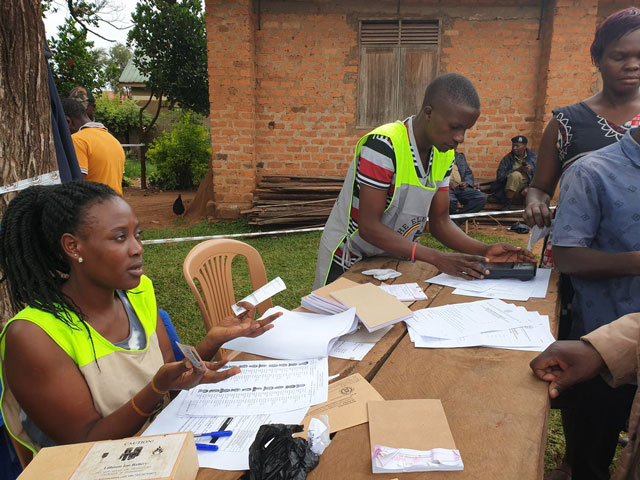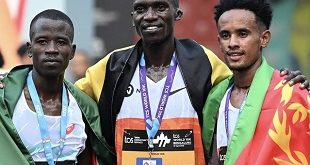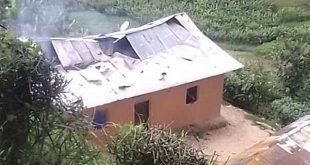
Little support from the political parties
UNNGOF stated that while the NVR update exercise is a technical electoral process conducted by the EC, the process exists in an electoral ecosystem where success is a function of perceptions, trust, and credibility of the EC. Prior to the update exercise, the EC engaged political parties to support and publicize the NVR update.
UNNGOF noted with concern that the participation of political parties and formations remained low at both monitoring as well as publicizing the exercise.
Out of the 729 update centers visited countrywide, only 11% had agents or representatives of political parties and formations monitoring the conduct of the update exercise.
NRM agents were present at 50% of the centers, followed by FDC (20%), UPC (10%), DP (8%) and JEEMA (1%). The People Power political group had agents in 10% of the update centers observed.
Only political formations and parties including: People Power, NRM and FDC were observed promoting the exercise through social media and in a few instances within communities. Besides social media, the update exercise was mainly publicized through: TV/radio/print media, community leadership structures, as well as opinion/religious leaders.
Poor voter education
Acording to the UNNGOF report, the Electoral Commission elected to partner with commercial media agencies to publicize the exercise.
“Whereas standard practice is that voter education should be conducted before the update exercise, to allow prospective voters to know about the process, its prerequisites, and how to optimize opportunities presented through the process, this was not executed. Voter education was conducted concurrently with the update exercise through conventional and non-conventional media channels including: social media, radio, TV, community radios, mobile billboards.”
Key voter education providers during the update exercise included; the Electoral Commission, the Uganda National NGO Forum (UNNGOF) and political parties. The late onset of voter education had notably serious implications.
Multitudes of prospective registrants were either unenthusiastic to go to update centers or went to the centers with limited knowledge of what the process entailed, what was required of them and what was involved. Some enrollment officers exploited the little information around the exercise to extort money from applicants through selling transfer forms; ask for irrelevant/inappropriate documentation such as voter location slips other than National IDs or National Identification Numbers (NINs); and in other cases transfer or refuse to register or transfer applicants without legitimate reasons. Media channels provided information about the update exercise to the public in the most accurate, unbiased, and objective way. The media played this role through radio and television programs on the process, flighting advertorials, and carrying stories on the exercise, especially the trends and emerging issues during the process.
Heavy Rains
Observers noted the challenges that the update exercise encountered due to the adverse effects of two catastrophes – heavy rains in the western part of Bundibugyo that resulted into flooding and the landslides in Bududa district. Both calamities left hundreds of families displaced and the exercise severely interrupted in those specific areas. Power interruptions in some areas also hampered the exercise due to intermittent power supply to the registration equipment/kits. Some update centers in the affected areas had to close down on account of the weather during the exercise. Generally, most parts of the country experienced heavy rains during the exercise, which created either delays in opening of the centers or early closing. UNNGOF commends the EC for re-planning to ensure that the update exercise was extended for about two (2) weeks to ensure that persons in the affected areas were given an opportunity to register.
Youths not attracted
Youth participation (citizens aged below the age of 30) in electoral processes in Uganda has always been low, with previous registration processes and resultant voters’ rolls under-representing the youth demographic.
UNNGOF observers presented anecdotal evidence that suggests low trend of youth participation. Whereas the update exercise was meant to offer students who have turned 18 an opportunity to register as voters, cases of learners not possessing the appropriate documentation such as birth certificates, National Identification Numbers (NINs), copy of parent(s)’ National IDs resulted into many being turned away. In some cases, government offices were charging (relatively) high amounts for learners to procure copies of their respective birth certificates – something that is likely to have discouraged many. Observer reports indicate that, 49% of potential youth applicants were turned away for lack of NINs from parents, 48% were turned away for lack of NIRA/LC letters. A negligible percentage of youths were turned away for being non-citizens especially at boarder areas.
Special interest groups
Throughout the voter register update exercise, special interest groups and traditionally marginalized communities were observed participating in the process. In all the 729 update centers observed, EC officials made deliberate efforts to ensure that the elderly, nursing and pregnant women and persons with disabilities received necessary assistance, including preferential treatment. Enrollment officers often times assisted persons to complete the registration forms. In the same spirit, observers reported that 94% of the update centers visited were easily accessible to PWDs. More so, 5% of the update centers had PWDs as enrollment staff. Observers noted and commends the setting up of update centers at public places like schools, hospitals and community centers. However, observers noted that these centers were not sufficiently publicized to ensure that all eligible (special interest group) citizens could take advantage of them to easily participate in the update exercise
 The Independent Uganda: You get the Truth we Pay the Price
The Independent Uganda: You get the Truth we Pay the Price



